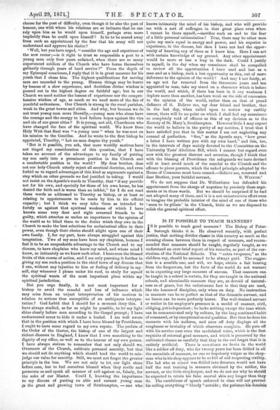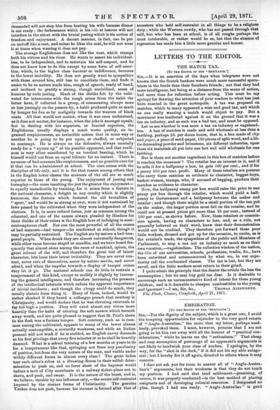IS IT POSSIBLE TO TEACH MANNERS?
S it possible to teach good manners? The Bishop of Peter- I. borough thinks it is. He observed recently, with perfect justice, that nothing divides classes in this country so much as the amazing chasm between them in respect of manners, and recom- mended that manners should be taught, regularly taught, as we understand an over-brief report of his remarks, as part of the cur- riculum of the National Schools. The "extra twopence," as the children say, should be assumed to be always paid. The sugges- tion is a sensible one, and will, we hope, obtain a fair hearing from the Inspectors, but the facts of the world do not warrant us in expecting any large measure of success. That manners can be taught in a school is certain, for they are taught in the national schools, and abominable manners they are, as devoid of natural- ness as of grace, but the unfortunate fact is that they are used, like the lessons of discipline, only when on duty. No instruction in manners can be so perfect as that of the domestic servant, and no lesson can be more perfectly learnt. The well-trained servant or waiter in his employer's presence is a model of manner, civil, obliging, yet independent ; he lacks nothing except the tone which can be communicated only by culture, by the long continued habit of command, or by exceptional moral qualities. But then he dons his manners with his uniform, and once off duty displays all the roughness or brutality of which observers complain. He puts off with his service coat even the modulated voice, which is the first requisite of external good manners, and which is preserved by the cultivated classes so carefully that they in the end forget that it ift entirely artificial. There is sometimes no brute in the world like a soldier off duty, who for twenty years has been drilled in all the essentials of manners, no one so hopelessly vulgar as the shop- man who in his shop appears to be so full of self-respecting civility.. The lad who at school was drilled into decorum would not have half the real training in manners obtained by the soldier, the servant, or the little shopkeeper, and we do not see why he should be expected to retain his false mental skin any longer than they do. The carefulness of speech enforced in class will not prevent his calling everything "bloody outside ; the patience his' dominio demanded will not stop him from beating his wife because dinner is not ready ; the forbearance which is his role at lessons will not interfere in the street with the brutal jesting which is his notion of freedom and enjoyment. A decent manner, in fact, can be put on and off like a coat, and unless he likes the coat, he will not wear it at times when wearing it does not pay.
The average Englishman does not like the coat, which cramps both his virtues and his vices. He wants to assert his individual- ism, to be independent, and to maintain his self-respect, and he does not know how to do this except by some form of self-asser- tion, which, in the higher class hauteur or indifference, becomes in the lower incivility. He does not greatly want to sympathize with those around him, still less to conciliate them, and finds it easier to be as nature made him, rough of speech, ready of hand, and inclined to gratify a strong, though uncivilized, sense of humour by rude jesting. Much of the dislike felt by the culti- vated for intercourse with the rough arises from the habit the latter have, if collected in a group, of commenting always more or less jeeringly on the passers-by, a habit produced quite as much by hunger for fun as by malignity towards the wearers of black coats. All that would not matter, when it was once understood, as it does not matter, for instance, when the joke is amongst equals; but in dealing with his superiors, or fancied superiors, the Englishman usually displays a much worse quality, an in- grained suspiciousness, an invincible notion that in some way or another he is going to be put upon, or chaffed, or subjected to contempt. He is always on the defensive, always mentally ready for a "square up" at his possible opponent, and that readi- ness is very often manifested by an insolent bearing, which he himself would not from an equal tolerate for an instant. There is no cause of bad manners like suspiciousness, and no possible cure for it that can be administered at school. The cure comes with the discipline of life only, and it is for that reason among others that in the English lower classes the manners of the old are so much superior to those of the young. The enjoyment of jeering and horseplay—the more insulting the jeer the greater the enjoyment— is equally ineradicable by training, for it arises from a feature in the national character, a delight in any cruelty which is slightly humorous, the feature which fostered the old brutalities of "sport," and would be as strong as ever, were it not restrained by laws passed by the cultivated when they were independent of the electors. It is, in more refined forms, just as common among the educated, and one of the causes always pleaded by Hindoos for their dislike of their rulers is the English love of indulging in semi- contemptuous chaff. Nor can the most powerful of all the causes of bad manners—bad temper—be eradicated at school, though it may be partially restrained. The English are by nature a bad-tem- pered people. When drunk they are almost universally dangerous, while other races become stupid or maudlin, and we have heard fre- quently that almost alone among the races of mankind, opium, the great solvent of the will, and therefore the great test of latent 'character, lets loose their latent irritability. They are never con- tent, never sure of themselves, never by nature servile, and never afraid, and when the impulse towards a display of temper comes they let it go. The national schools can do little to restrain a temperament of this kind, except to mollify it slightly by increas- ing the general intelligence, and therefore increasing the pressure of the intellectual interests which reduce the apparent importance of trivial incidents ; and though the clergy could do much, they usually abstain from doing it. Many of them, indeed, would be rather shocked if they heard a colleague preach that courtesy is Christianity, and would declare that he was elevating externals to fax too high a position. They will extol almost any virtue more heartily than the habit of uttering the soft answer which turneth away wrath, and are quite pleased to suggest that St. Paul's thorn in the flesh was a furious temper. Soft courtesy, such as is com- mon among the cultivated, appears to many of the lower classes actually contemptible, a cowardly weakness, and while an Italian peasant will not work if he is scolded, an English navvy demands as his first privilege that every five minutes or so he shall be heartily damned. What is a school training of a few months or years to do for a temperament like that, springing not from any peculiarity of position, but from the very nature of the man, and visible under widely different forms in almost every class ? The great ladies tear each other's robes at a Drawing-Room in their selfish deter- mination to push on, and no force short of the bayonet would induce a mob of City merchants at a railway ticket-place not to shove, and push, and swear. It is the nature of the beast, and is, we believe, curable by one influence only,—the severe self-restraint imposed by the sterner forms of Christianity. The genuine Yankee does not push, because his manner is formed after that of ancestors who held self-restraint in all things to be a religions duty ; while the Western rowdy, who has not passed through that mill, but who has been at school, is of all roughs perhaps the most intolerable, or rather would be so, but that the absence of repression has made him a little more genuine and honest.



































 Previous page
Previous page